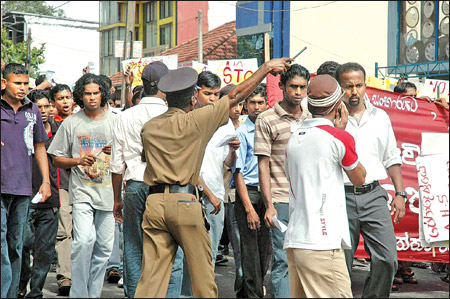Towards productive higher education
Rajiva WIJESINHA
Speech on the Adjournment Motion on University Reforms, May 20 in
Parliament.
We have to recognize that education means not just academic learning,
but also the development of professional and vocational skills, and the
soft skills that will allow these too to be used productively.
|

Student protests affect the academic environment. File photo |
We need to promote variety in Education recognizing that the role of
the State is to ensure that no one is deprived of quality education
because of lack of resources, but that the State should also encourage
other initiatives.
As the Higher Education Minister pointed out yesterday, the State
should monitor such initiatives to prevent exploitation, and also take
advantage of the benefits they provide for those who need support.
Resisted change
Unfortunately our system so far has relied on monopolies, monopoly of
supply and monopoly of attitude. We have relied on traditional systems,
generally outdated British systems that even the British do not use any
more, and have resisted change.
Sadly, much of the resistance to that change has come from a few
students. They have imposed their will on others so that often the
system has been disrupted and necessary changes sabotaged.
Ragging plays a significant part in this. Ragging, is not only an
obvious example of the violation of individual rights, it is also a
method of ensuring submission. It targets the weak and the vulnerable in
particular, and batters them into obedience.
Year after year I have seen students forced to wear clothes of a
particular sort and walk in a particular fashion, forced to eat food
from common plates, forced into practices that strip them of their
individuality.
And then they are forced to demonstrate against the authorities,
forced to take up causes that they are of little concern to them, on the
grounds that they must function as a monolithic group.
Ragging
The time that is wasted on ragging, is another element that destroys
actual education. The habit of focused study is destroyed in the first
few weeks. Those who are hardest hit are the students of Arts Faculties,
and many then resort to the rote learning which, as we were told
yesterday, is also encouraged by the school examination system.
This is sad because, when students come to university, they are
bright and eager to learn in an adult way. Reducing them to dependence
on their seniors, and on notes, means that many do not fulfil their full
potential. That in turn prevents them finding productive employment.
But we must also recognize that our academics too are sometimes at
fault. Often we do not respond swiftly to the real problems students
face. Our counseling systems are weak.
Appointments to positions that require training and sensitivity are
given for personal reasons. There is insufficient attention to
professional development, while promotions and indeed confirmations are
not based on performance but rather on grace and favour or simple
longevity.
We also perhaps created a problem when we expanded universities
swiftly, certainly a positive measure, but one that led to many
appointments to academic and administrative positions of personnel who
were not of the highest caliber. After they get entrenched, they tend to
resent those who are brighter and more able.
Sadly, as excellence gets diluted, requirements for promotion are
relaxed. Simple long service leads to chairs and administrative
positions that are then used to perpetuate mediocrity. It is the
students who suffer then, particularly when this means strong opposition
to innovation.
With this and other such problems, we have moved more slowly than we
should have done on curriculum reform. The soft skills that students
need are not made mandatory. In many Universities we still rely on the
British view that the Advanced Level Examination provided enough of a
General Education, whereas even in Britain now educationists are moving
to the IB system which demands a wider range of subjects.
Outdated theories
We can deal with this at University at least by insisting on
Communication Skills, on Problem Solving and Decision Making exercises,
on Leadership Training and Role Plays. But we continue to stress
outdated theories and regurgitate old lecture notes which students
sometimes ask us to read out at dictation pace so they can faithfully
copy them down.
This is not of course true of many academics, but it should be true
of none. Meanwhile we could introduce a novel approach to learning
through pre-University courses that could be conducted on a regional
basis.
Such courses could also include social service projects that would
allow for productive group work. This, rather than combative political
demonstrations, would be a better first experience for university
students of working together with their fellows.
Some sort of National Service is perhaps an ideal we should move
towards, given the importance of developing in our students a sense of
responsibilities as well as rights. But if that is too complicated,
opportunities to work and learn together in a disciplined environment
would be a helpful precursor to university courses.
We need, to move towards new models. We have an excellent system of
basic education, but we need in today’s world to fine tune it, to
maximize opportunities for all our youngsters, and in particular those
whose own resources are limited.
We should also seek, through focusing on what is essential, to allow
students to enter the world of work early, to finish courses in the
three years that is normal in Britain with a similar Advanced Level
system, or to take split courses with credit for project work and
professional assignments.
What we need is not just learning but also skills, not just abilities
but also initiative. We know that our students, who do so well in other
systems in other countries, are amongst the best in the world. They can
live up to challenges, we should ensure that they are challenged
productively, not through the dead ends represented by ragging and the
copying of outdated notes. |



